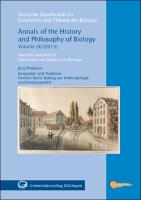Innovation und Tradition. Herbert Bachs Beitrag zur Anthropologie und Humangenetik
Author(s)
Pittelkow, Jörg
Collection
AG UniversitätsverlageLanguage
GermanAbstract
This book examines the contribution of the German biologist Herbert Bach (1926 – 1996) to physical anthropology and human genetics in Eastern Germany. It highlights his scientific achievements and publications, his work as director (1960 – 1993) and lecturer at the Institute of Anthropology in Jena (Germany). In order to trace his contributions, this work outlines the previous historical development of the Institute of Anthropology under Hans Friedrich Karl Günther (1930 – 1935) and Bernhard Struck (1936 – 1960). Bach fostered the cooperation between anthropology and genetics by examining anthropological data within a genetic framework. His major accomplishments included the prehistoric anthropology of former populations in central Germany and the implementation of genetic counseling services in Eastern Germany. As director of the Institute of Anthropology, he advanced anthropometrie and prehistoric anthropology and expanded teaching in content and scope. He elaborated new anthropological curricula of biologists, teachers and physicians. In addition Bach re-built the anthropological institute, shifting its focus from ethnology to genetics and expanding the scope of research and teaching. He also integrated the institute into a network of genetic counseling services. Das Buch befasst sich mit dem Beitrag Herbert Bachs (1926 – 1996) zur Anthropologie und Humangenetik. Untersucht wurden seine wissenschaftlichen Leistungen auf diesen Gebieten, seine wissenschaftsorganisatorischen Aktivitäten, vor allem als Institutsdirektor, sein Wirken als Hochschullehrer und sein publizistisches Werk. Ausgehend von seinen Vorgängern im Institutsdirektorat, Hans Friedrich Karl Günther (1930 – 1935) und Bernhard Struck (1936 – 1960) wird der Erneuerung der Anthropologie in Jena nachgegangen. Hierbei zeigte sich, dass Bach immer vom Grundsatz der engen Verflechtung von Anthropologie und Humangenetik, insbesondere von der Möglichkeit der Kausalanalyse anthropologischer Befunde mit Hilfe der Genetik ausging. Innerhalb des Instituts legte er die anthropologischen Schwerpunkte auf die Entwicklungs- und die Prähistorische Anthropologie, während er die Humangenetik auf Weiterentwicklung und Anwendung der Labordiagnostik sowie auf die humangenetische Beratung konzentrierte. Seine persönlichen Arbeitsgebiete waren die Prähistorische Anthropologie sowie die humangenetische Beratung und deren Grundlagen. Die Lehre weitete er sowohl hinsichtlich des Inhalts als auch Adressatenkreises erheblich aus, wobei er sich unter anderem für die Integration anthropologischer und humangenetischer Lehrgebiete in das Medizinstudium engagierte. Als Direktor wandelte Bach das anthropologisch-völkerkundliche Institut in eine moderne anthropologisch-humangenetische Lehr- und Forschungsstätte um und prägte zugleich den Aufbau des humangenetischen Beratungsdienstes der DDR wesentlich.
Keywords
Innovation; Anthropologie; Biologie; Deutsche Demokratische Republik; Genetik; Humangenetik; JenaDOI
10.17875/gup2018-1084ISBN
9783863953553OCN
1038427394Publisher
Universitätsverlag GöttingenPublication date and place
2018Classification
Biology, life sciences


 Download
Download